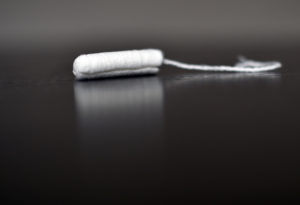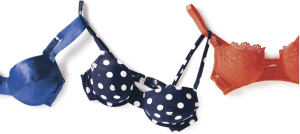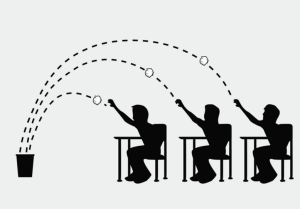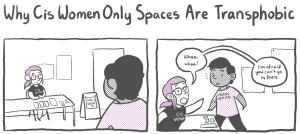In college, I worked as a janitor at night to help cover my rent and food. Going to school full-time was expensive, and I knew that I wanted to reduce my debt burden, so I never took out loans to pay for living expenses. As a result, I was often cash-strapped and looking for any way to save money.
One way I found was to use the menstrual products – pads and tampons – that we used to stock the machines and complimentary baskets in the offices we cleaned.
Over the eight months I worked there, I estimated that I saved around $50. Which may seem like a small amount, but considering I was making $8 per hour, that was almost an entire day’s work.
Just to manage my period.
(For clarity’s sake, here’s my math: Using Target’s prices as a baseline, a box of tampons costs about $6 per box of 40, which puts a single tampon at about fifteen cents.
Doctors recommend changing a tampon every four to eight hours, so assuming you sleep with one for eight hours and change every four hours, otherwise, you’re using five to six tampons per day. So let’s round up to a dollar each day for ease of adding. Periods typically last four to eight days and occur every 28 days, though mine is always on the longer side, meaning I was using one of those boxes of 40 every month and then some.)
Of course, I felt bad. I knew I was stealing and I wasn’t proud of it. But I was also frequently asked to work off the clock to save the company money and was even asked to come into work when I had the mumps, so $50 in tampons seemed like a fair enough swap.
Plus, I felt really, really fortunate that I even had access to menstrual products. Plenty of people who have periods don’t – and lawmakers have the power to reduce the barriers to access.
That’s because, in addition to the fact that they’re fairly cost prohibitive on their own, pads, tampons, cups, liners, and period panties are, by and large, subject to the same taxes as other non-essential products.
In dozens of states, the sales tax code has been amended to create loopholes for food, medication (including, depending on where you live, nicotine patches, Rogaine, and even Viagra), and other necessary products – and yet, few have passed laws which would exempt menstrual hygiene products.
As of the last legislative session, just twelve states had created an exception.
Those of us who have periods (typically about 450 in a lifetime) can expect to pay hundreds of dollars in our lifetimes just in additional taxes.
And while more and more states have been considering removing period products from their lists of taxable products, these bills face huge opposition from conservative lawmakers – that is, lawmakers who are cisgender men and have never menstruated.
Which is illogical, considering the strong arguments against taxing these products, including the following reasons:
1. They’re Not a Luxury
There are no two ways about it: Menstrual products aren’t optional. And generally, necessary items – like food and medicine – are exempt from sales taxes.
That allows quite a bit of wiggle-room (plenty of snack foods that aren’t exactly life-sustaining are untaxed, as are over-the-counter medications, like, Aspirin, which is possible to live without), meaning it’s actually not that hard to simply re-classify menstrual products, thus removing the tax.
Menstrual products are so necessary that the United Nations stated in 2013 that access to menstrual products isn’t just a nice thing to have – it’s a basic human right along with water and other sanitation needs.
Women and girls gain privacy and dignity through proper sanitation and menstrual hygiene facilities. It is now well known that poor sanitation facilities in schools prevent girls from attending school, especially during menstruation.
The use of binary/normative language here isn’t ideal, since there are also folks like trans men and non-binary people who menstruate.
But the idea remains important: That if you have periods, menstruation, and a lack of menstrual products can keep you away from your daily activities, including work and school – and that limiting access (as has happened in detention facilities) is wrong.
The solution is a really easy one: Period products. In this way, menstrual hygiene materials are more like food, which is typically untaxed, than, say, candy, which is also often untaxed.
“But toilet paper and soap are also taxed!” you may point out – which is true, and an example of how inconsistent sales taxes really are. But toilet paper is easier to access if you need it (public restrooms have it) and much less expensive than period products to purchase.
Period products also aren’t able to be written off on annual taxes, whereas people can write off the mortgage on their home (or their second home) and even get a tax break for buying a jet (yes, really), it seems absurd that I can’t write off a pair of period underwear like THINX.
Lack of access to menstrual products can mean the difference between being able to go to school, work, or just live your life. This seems like a pretty good reason not to tax them, but there are plenty of others, too.
2. They’re Already Hard Enough to Get and Afford
Menstrual products are already pretty expensive, and few public health agencies make access to these products a priority. Instead, the access gap is typically bridged by nonprofits, like Distributing Dignity, and the faith community.
Excluding these products from the tax is a relatively easy way to bring down the cost and help make them more affordable for everyone.
Though reusable products have become much more popular – between THINX and the various cup options, you’ve got a lot of choices – they also require more capital upfront than is comfortable for many people.
A menstrual cup can run up to $40 with tax, while period undies, which must be washed and dried and thus necessitate multiple pairs, are more than $25 apiece. Additionally, they don’t work for everyone (I’ve never been able to get a menstrual cup figured out for the life of me).
The difficulty in accessing menstrual products is, of course, also a serious issue for people who menstruate and live outside. Unlike toilet paper or even soap, which can be acquired from public restrooms, menstrual products are rarely available anywhere other than a store.
Where, again, they’re taxed.
Even for those who can afford period products, we’re still extremely sheepish about them in public and the workplace. It’s considered a huge perk when offices stock the bathroom with complimentary tampons (again, something that a very large portion of the population requires on the regular) and public restrooms are notoriously poorly stocked.
My gym doesn’t even have a tampon dispenser, meaning that I’ve had to cut my workout short more than once (though I’d like to publicly acknowledge that my local NFL stadium, CenturyLink Field, does have complementary ‘pons. Thanks, Seahawks!).
And because tampons aren’t considered medically necessary (despite their definition as “medical devices” by the FDA), they’re also not covered by HSA programs. People with periods are completely on their own.
Essentially, there are numerous ways that we’re forced to pay extra for these products, where similar products – which are just as necessarily if not less so – aren’t subject to the same costs.
Without a strong backup, social safety net, or even economic incentive to help people with periods access these necessary products, taxation adds insult to our injury.
3. The Tax Raises Negligible Revenue
The point of taxes is, quite simply, to put revenue into local and federal governments. Roads, fire services, schools, social services, higher ed, safety and law enforcement, and municipal providers – like water and sewage – are all funded by tax dollars.
This may include, depending on where you live, income taxes, sales taxes, taxes on businesses, or taxes on services. Taxes may also be used to deter behavior, such as taxes on specific items, like alcohol, soda, and cigarettes (often referred to as a “sin tax”).
So where do menstrual products fall into that rubric? In most states, they’re taxed similarly to non-essential items or things like shoes and clothing (which could easily be argued as “essential,” but that’s an argument for another day).
In general, a sales tax isn’t an especially progressive way to raise revenue.
It disproportionately impacts the poor and can make it hard for people to get by. But carve-outs for things like food, bottled water, and medicine seek to ease that burden.
Which is to say, it’s not that hard to change the tax code subtly to make it more equitable. The most common reason lawmakers don’t want to do it is due to the lost revenue.
And despite the fact that a whole lot of people pay this tax every single day, menstrual products aren’t exactly drumming up tons of money for the government.
“California’s Board of Equalization estimates that exempting tampons and pads from tax will reduce revenue by $20 million a year,” according to a CNN Money report. “That’s a pittance relative to the more than $100 billion collected by the state annually.”
Reminder: Protecting Donald Trump in New York City cost the city about $1 million per day.
States that are concerned about the shortfall can also get creative in finding new sources of revenue which are spread more evenly across earners and genders. California State Assemblywoman Cristina Garcia (D-Bell Gardens) and Assemblywoman Lorena Gonzalez Fletcher (D-San Diego) recently introduced the “Common Cents” bill, which would end the tax on menstrual products and diapers and replace it with a small tax on hard alcohol.
“No one can claim liquor is a basic necessity of life,” Garcia stated.
4. It’s Plainly Discriminatory
There are a number of economic and logical reasons why taxing menstrual products doesn’t make sense – it’s an unnecessary hardship on top of an expensive product that’s already difficult to get, it doesn’t square up with much of the rest of the tax code, and it doesn’t actually help keep the economy afloat.
But on top of that, it’s also just discriminatory. There’s no other product which is so clearly the burden of people who menstruate alone.
Though not all women menstruate (and some people who menstruate aren’t women), the tax on menstrual products does put a disproportionate burden on one subsection of the population, and it’s the exact subsection of the population who already tend to earn less over a lifetime (whether it’s women or trans folk or non-binary people).
Which is probably the clearest reason why these products continue to be taxed. Because if there had been period-havers at the table when these sales taxes were originally drafted, you can bet that there would’ve, at the very least, been a conversation about where the lines are drawn.
***
More and more states are catching on – as more and more people who menstruate are getting elected and involved in politics – and in the last few years, the “tampon tax” has become a much bigger topic of conversation.
And while some people may think it’s small potatoes, it’s also a really small, meaningful change that just doesn’t take that much effort on behalf of lawmakers.
So what can you do?
If you live in one of the states that doesn’t currently exempt tampons from the sales tax, write to your lawmakers and tell them that you think it’s time to amend the tax code where you live.
And if you do live somewhere where the lawmakers have already acted, drop them a line to show your support. It’ll help encourage them to look for other ways to make the laws more equitable.
[do_widget id=’text-101′]
Hanna Brooks Olsen is a Contributing Writer for Everyday Feminism, a small human, and a Millennial. Her interests are politics, podcasts, Pac-12 football, feminism, and Oxford commas. She is curious to a fault. Follow her on Twitter and Medium @mshannabrooks. Read her articles here.
Search our 3000+ articles!
Read our articles about:
Our online racial justice training
Used by hundreds of universities, non-profits, and businesses.
Click to learn more





















